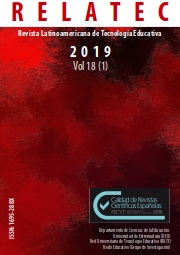A service-learning proposal in the initial training of social educators: closing the older peoples’s digital gap
DOI:
https://doi.org/10.17398/1695-288X.18.1.149Keywords:
Service Learning, University, Digital Gap, Initial Training of Educators, Older People, Digital TechnologiesAbstract
Service Learning (ApS) is a powerful educative methodology into higher education in our country. In this article we present an experience based on the ApS. Where we analyze the different phases through which this methodology passes in a specific case at the University of Valladolid. The experience was carried out with students of the Bachelor Degree in Social Education in the subject of ICTs Applied to Education in the first year and a group of some forty Elderly People in the Municipal Centers of the City of Valladolid. The main objective of the educational process is to cover a demand of older people who attend these centers over the digital world through a training process that includes the use of different apps, online services and other digital tools. The objective for the univesity students was that they are capable of developing social and civic competences, acquiring an ethical commitment and a social responsibility through the transfer of their theoretical knowledge to the practice, elaborating a design of a proposal of media literacy for elderly people and their implementation in the university classrooms in a morning session of coexistence.
Downloads
References
Aramburuzabala, P.; Ballesteros, C.; García, J.; Lázaro, P. (Coords.) (2018). Cuaderno de resúmenes del IX Congreso Nacional y I Europeo de Aprendizaje-servicio Universitario. Madrid: UAM, UNED y U. Pontificia Comillas. Recuperado a partir de https://eventos.uam.es/20800/files/ix-congreso-nacional-y-i-europeo-de-aprendizaje-servicio-en-educacion-superior.html
Arriazu-Muñoz, R. (2015). La incidencia de la brecha digital y la exclusión social tecnológica: el impacto de las competencias digitales en los colectivos vulnerables. Praxis Sociológica, 19, 225-240.
Batllé, R. (2011). ¿De qué hablamos cuando hablamos de aprendizaje-servicio? Crítica, 972, 49-54.
Batlle, R. (2014). La evolución del aprendizaje-servicio en España. Cuadernos de Pedagogía, 450, 57-59.
Cruz Mora, M. (2016). Reforzando el tejido social: el papel de los ayuntamientos en el impulso del ApS. Convives, 16, 27-31.
Gil-Gómez, J.; Moliner-García, O. y Chiva-Bartoll, O. (2016). Aprendizaje-servicio en futuros docentes: desarrollo de la competencia social y ciudadana. Revista Complutense de Educación, 27, 53-73. DOI: http://dx.doi.org/10.5209/rev_RCED.2016.v27.n1.4507
Gross, B.; Contreras, D. (2006). La alfabetización digital y el desarrollo de competencias ciudadanas. Revista Iberoamericana de Educación, 42, 103-125.
Ibarrola, S.; Artuch, R. (2016). La docencia en la universidad y el compromiso social y educativo. Contextos Educativos, 19, 105-120. DOI: 10.18172/con.2763
INE (2018). Encuesta sobre el equipamiento y uso de las TICs en los hogares. Año 2018. Recuperado a partir de https://www.ine.es/dyngs/INEbase/es/operacion.htm?c=Estadistica_C&cid=1254736176741&menu=ultiDatos&idp=1254735976608
Manzano, V. (2010). El modelo de aprendizaje-servicio y su potencial para la educación superior. Conferencia inaugural de las VI Jornadas de docencia en Psicología. Universidad de Sevilla, 15 de junio.
Martínez, M. (Ed.) (2010). Aprendizaje Servicio y responsabilidad social de las universidades. Barcelona: Octaedro/ICE-UB.
Martínez-Urrasalde, M. J.; Zayas-Latorre, B.; Sahuquillo-Mateo, P.M. (2016). ApS y ciudadanía comprometida: aproximación descriptiva-exploratoria a un caso. Opción, 8, 187-208.
Universidad de Valladolid (2009). Memoria del Grado de Educación Social. . Recuperado a partir de http://www.feyts.uva.es/?q=grados
Pérez-Gómez, A. (2010). La naturaleza del conocimiento práctico y sus implicaciones en la formación de docentes. Infancia y aprendizaje, 33(2), 171-177. DOI: 10.1174/021037010791114652
Puig, J.M., Gijón, M., Martín, X. Y Rubio, L. (2011). Aprendizaje-servicio y Educación para la Ciudadanía. Revista de Educación, número extraordinario, 45-67.
Rodríguez Gallego, M. (2014). El Aprendizaje-Servicio como estrategia metodológica en la Universidad. Revista Complutense de Educación, 25 (1), 95-113. DOI: http://dx.doi.org/10.5209/rev_RCED.2014.v25.n1.41157
Teijeira, E. (2016). Aprendizaje-servicio, una metodología que funciona. Convives, 16, 5-11.
Travieso, J.L.; Panella, J. (2008). La alfabetización digital como factor de inclusión social: una mirada crítica. UOC Papers, 6. Recuperado a partir de http://uocpapers.uoc.edu/uocpapers/6/dt/esp/travieso_planella.html
Vidal, F. (2016). La integración digital de las familias españolas. En INFORME España 2016 (pp. 183-230) [coordinación y edición Agustín Blanco y Antonio Chueca]. Madrid: Universidad Pontificia Comillas.
Downloads
Published
Issue
Section
License
Authors who publish in this journal accept the following conditions:
1. The Author retains copyright in the article. Upon acceptance of the article, the author shall grant to the Publisher the right of first publication of the article. with the dcoument registered with the Creative Commons Attribution-NonCommercial-NoDerivative 4.0 International (CC BY-NC-ND) license, which allows to third parties to use what is published whenever they mention the authorship of the work and the first publication in this journal.
2. Authors can make other independent and additional contractual agreements for the non-exclusive distribution of the article published in this journal (eg, include it in an institutional repository or publish it in a book) provided they clearly indicate that the work was published for the first time in this journal.
3. Authors are allowed and recommended to publish their work on the Internet (for example on institutional or personal pages) before and during the review and publication process, as it can lead to productive exchanges and a greater and faster diffusion of published work (see The Effect of Open Access).









